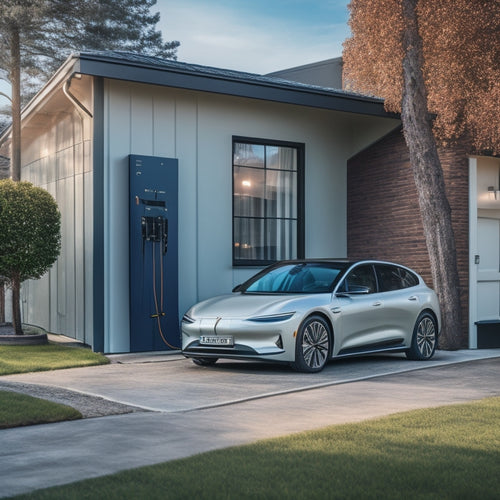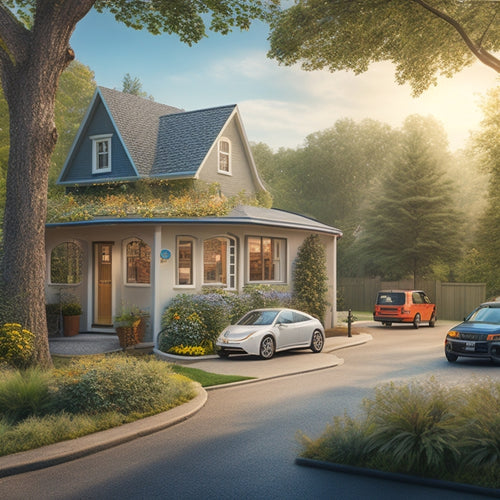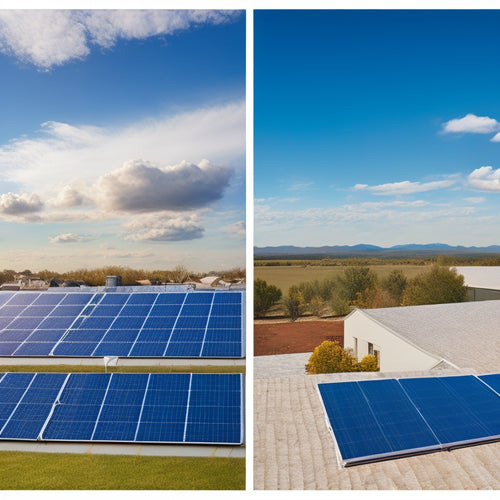
What You Need to Know About the Cost of Residential Solar Panels
Share
When considering residential solar panels, you need to understand the factors that affect the overall cost, which can range from $15,000 to over $30,000. The type and efficiency of the panels, installation method, and system size all play a role in determining the total installation cost. Additionally, installation complexity, location, and additional expenses like local regulations and hardware can influence the final price. Fortunately, federal and state incentives can help reduce the upfront cost, making solar panels a more affordable option. As you investigate your options, you'll want to crunch the numbers to see how the costs stack up against traditional energy sources.
Key Takeaways
- The cost of residential solar panels varies depending on the type, efficiency, and durability of the panels, as well as the installation method.
- Installation complexity, system size, and location impact the overall cost, with roof-mounted systems being generally less expensive than ground-mounted.
- Federal and state incentives, such as tax credits and rebates, can significantly reduce the upfront cost of solar panels and enhance their financial returns.
- Solar panels can lead to long-term savings and benefits, including reduced energy bills, energy independence, and a lower carbon footprint.
- Comparing costs to traditional energy sources shows that financing solar panels can lead to savings of approximately $6,000 over 20 years, while upfront payment leads to $14,000 savings.
Understanding Solar Panel Pricing
When considering a residential solar panel system, understanding solar panel pricing is essential to making an informed decision. You need to know what factors contribute to the overall cost of the system.
Solar panel types play a significant role in pricing. Monocrystalline, polycrystalline, and thin-film panels vary in efficiency, durability, and cost. Monocrystalline panels are the most efficient but also the most expensive, while thin-film panels are the least efficient but most affordable.
Installation methods also impact pricing. Roof-mounted systems are the most common, but ground-mounted systems can be more expensive due to additional hardware and labor required. Tracking systems, which adjust the panels' angle to maximize energy production, add to the cost.
Understanding these factors helps you compare quotes from different installers and make an informed decision about your residential solar panel system.
You'll be able to assess the value of different systems and choose the one that best fits your needs and budget.
Factors Affecting Installation Costs
Calculating the total cost of a residential solar panel system involves more than just the price of the panels themselves.
You'll also need to take into account the installation costs, which can vary greatly depending on several factors. One key factor is installation complexity. If your roof has multiple levels, skylights, or other obstructions, installation will be more challenging and expensive.
The system size also plays a major role in determining installation costs. Larger systems require more labor, materials, and equipment, increasing the overall cost.
Additionally, you should take into account the type of mounting system required. For example, a roof-mounted system will typically be less expensive than a ground-mounted system.
The location of your home is another important factor, as installation costs can vary by region due to differences in labor costs, local permitting fees, and other expenses.
Federal and State Incentives
Nearly every residential solar panel system installation qualifies for some form of federal and state incentives, which can greatly reduce the upfront cost of going solar. As a homeowner, you can take advantage of these incentives to offset the initial investment in your solar panel system.
At the federal level, you're eligible for a tax credit of up to 26% of the total cost of your solar panel system installation. This federal tax credit can be claimed on your tax return, reducing your tax liability.
Additionally, some states offer rebates for residential solar panel installations. These state rebates can range from a few hundred dollars to several thousand dollars, depending on the state and the size of your solar panel system.
You should research the specific incentives available in your state and factor them into your overall cost calculations. By combining federal tax credits and state rebates, you can greatly reduce the upfront cost of going solar.
This can make the switch to renewable energy more affordable and increase your return on investment.
Long-Term Savings and Benefits
Saving money on your energy bills is a significant advantage of going solar, and it's essential to evaluate the long-term savings and benefits of residential solar panels. By installing solar panels, you'll reduce your reliance on the grid and enjoy lower energy bills. Over time, these savings can add up, providing a significant return on your investment.
Additionally, you'll gain energy independence, reducing your vulnerability to rate hikes and grid outages.
Beyond financial benefits, residential solar panels also offer a positive environmental impact. By utilizing renewable energy, you'll reduce your carbon footprint and contribute to a cleaner, healthier environment.
As you join the growing community of solar-powered homeowners, you'll be part of a movement towards a more sustainable future. With solar panels, you'll not only save money but also do your part in reducing greenhouse gas emissions and promoting a cleaner environment for generations to come.
Comparing Costs to Traditional Energy
When you weigh the cost of residential solar panels against traditional energy sources, it's essential to contemplate the broader viewpoint: the overall expenditure of powering your home over time. This comparison is important because it helps you understand the long-term benefits of solar energy.
| Energy Source | Average Annual Cost | 20-Year Total Cost |
|---|---|---|
| Traditional Electricity | $1,500 | $30,000 |
| Solar Panels (with financing) | $1,200 | $24,000 |
| Solar Panels (without financing) | $800 | $16,000 |
As you can see from the table, solar panels can notably reduce your energy expenditure over time. With solar panel financing, you can still save around $6,000 over 20 years. If you opt to pay upfront, your savings can amount to $14,000. An energy consumption analysis can help you determine the ideal solar panel system size for your home, further optimizing your savings. By considering the long-term costs, you can make an informed decision about investing in residential solar panels.
Frequently Asked Questions
Can I Install Solar Panels on a Rented Property?
If you're a renter, you can investigate solar options, but you'll need your landlord's permission. Consider a solar lease or advocate for tenant rights to guarantee you benefit from the installation and reduce your energy bills.
Do Solar Panels Work During a Power Outage?
You might think solar panels are useless during outages, but they can actually provide backup power with the right equipment. During the day, your solar panel efficiency remains high, and with a battery storage system, you'll have power when you need it most.
Are Solar Panels Covered by Homeowners' Insurance?
You'll want to review your homeowners' insurance policy to see if it covers your solar panels, as standard policies often don't include insurance coverage; you may need to add a rider or separate policy, considering factors like replacement value and liability.
Can I Install Solar Panels on a Metal Roof?
Can you envision utilizing solar power on your metal roof? While it's possible, you'll face unique metal roof considerations, such as ensuring a secure mount, and installation challenges like dealing with thermal expansion and contraction.
Do Solar Panels Void My Roof Warranty?
When you install solar panels, you're likely wondering if it'll void your roof warranty. Typically, a solar panel installation won't automatically void your warranty, but it's vital to review your contract and guarantee the installation meets manufacturer specifications to avoid any roof warranty implications.
Conclusion
As you weigh the cost of residential solar panels, remember that investing in solar energy is like planting a tree - it may require upfront effort and resources, but it will bloom into long-term savings and benefits. With federal and state incentives, decreasing installation costs, and a significant reduction in your carbon footprint, going solar is a smart move. By understanding the factors that affect pricing and comparing costs to traditional energy, you'll be well on your way to utilizing the power of the sun and reaping its rewards.
Related Posts
-

5 Essential Tips for Buying EV Charging Systems Online
When purchasing an EV charging system online, you'll want to make sure you're making an informed decision. First, det...
-

Why Nearby EV Conversion Shops Matter to You
Having a nearby EV conversion shop means you'll experience the benefits of a more personalized, convenient, and susta...
-

Tracking Solar Panels Vs Fixed Panels Cost Savings
When considering solar panel options, you'll want to weigh the cost savings of tracking solar panels versus fixed pan...


